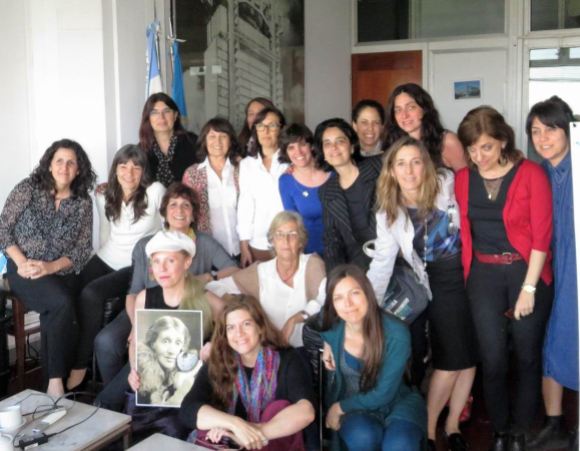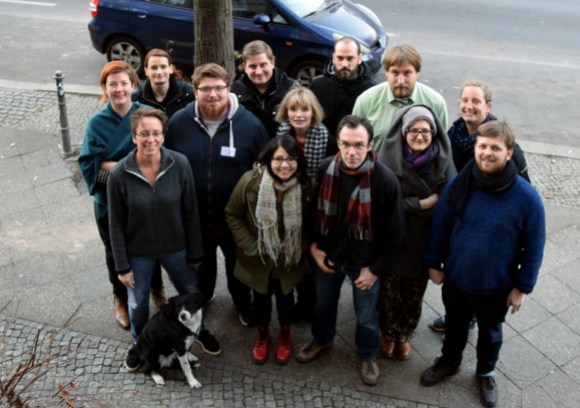
Female architects have played key roles in building designs throughout history, but their contributions have often been systemically minimized. For example, at least one historian has claimed that Elizabeth Wilbraham was the first professional female architect, but her Wikipedia article notes that her “work frequently may have been attributed to men.” More recently, some of today’s norms for public spaces, like having a play area for children, were a novelty in the first half of the twentieth century. The first architects to propose the idea were women.
This phenomenon has lasted into the present day in the overwhelming majority of architecture history books, with some including just one percent women.
Existing gender stereotyping in academic knowledge production has been shifted to Wikipedia. According to Wikidata, last year 5% of architectural biographies on Wikipedia were about women. This absence distorts the history of architecture. In order to fix this, we have created a working group with the goal of increasing the presence of female architects in Wikipedia.
In 2015, as part of the global editing campaign Women in Architecture, we organized three simultaneous editathons: at the University of Cordoba, Argentina; the Polytechnic University of Valencia in Spain; and Montevideo, Uruguay. During that event, the first category of female architects was created on the Spanish Wikipedia. That helped us realize that only 60 out of 1,200,000 biographies on the Spanish Wikipedia were about female architects.
Upon reviewing the articles, we found that traces of female architects tended to be obliterated, with their contributions being attributed to men, ranging from their partners, husbands, parents, or siblings. Not only were the biographies of a lot of prominent women architects missing, the articles were shorter than those about men architects. Moreover, they were not mentioned in the articles of their partners. Women biographies always linked to articles about men but rarely in reverse.
Villa Mairea was described as “a summer house built in 1938 in Noormarkku, Finland by the Finnish architect Alvar Aalto.” The article featured him as the sole protagonist of the design. Some parts of the article read: “Aalto raised it as the main idea, Aalto tried to avoid artificial patterns, Aalto modified certain details of the second proposal,” and so on. Although all the pieces of work made at the office carried a mutual signature of him and his wife that read “Aino and Alvar Aalto,” Aino’s name was not mentioned in her husband’s article.
Other examples include the House of the Bridge, where Amancio Williams was named as the only contributor—ignoring his wife, Delfina Gálvez Bunge. The Amphitheater of Cartagena was restored by Atxu Amann and Alcocer, Andrés Cánovas Alcaraz, and Nicolás Maruri, but only Cánovas was mentioned. The same happened with Pascuala Campos of Michelena and César Portela, and many others. It took a lot of work to review the articles and apply an equitable balance supported by reliable references.
Premio Hexágono de Oro is a prestigious award in Latin America. Cynthia Watmough, Laurinda Spear and Sandra Barclay are winners of the award who had no articles on Wikipedia, while men architect winners appeared in the article Colegio de Arquitectos del Perú. During the editathon, we have created articles for Premio Hexágono de Oro, Cynthia Watmough and Sandra Barclay. Laurinda Spear’s profile is still missing.
The problem was present on Wikimedia Commons, Wikimedia’s free media repository, as well. The images that we could use to illustrate the women articles did not identify them as authors of their own projects. We have created 212 categories of women architects on Wikimedia Commons.
This year, the working group has expanded. In October 2016 we repeated the editathon experience in Buenos Aires, Argentina; Montevideo, Uruguay and Valencia, Spain. We have also launched the Wikiproyecto Mujeres en la arquitectura (Wikiproject Women in Architecture).
Last year the Spanish Wikipedia had 5% of architect biographies about women. We helped increase this figure to 8% in 2016. We are very proud of the results and already excited for more work in 2017.
Andrea Patricia Kleiman, MA, co-founder of Wikiproject Women in Architecture
Ines Moisset, Ph.D AR, co-founders of Wikiproject Women in Architecture
This post comes from the Wikimedia community; the views expressed are the author’s alone and not necessarily held by the Wikimedia Foundation.
In brief

Partnerships and Resource Development group meets in Berlin: The Partnerships & Resource Development group is an initiative by Wikimedia France, Wikimedia Sweden and Wikimedia Germany to foster the international work on partnerships and external fundraising between Wikimedia affiliations. It was created to follow-up on the productive and inspiring conversations at the Wikimedia Conference (WMCON 2015) and the WMCON Follow-Up Day at Wikimania 2015.
Partnership enthusiasts from different Wikimedia affiliations were invited by Wikimedia Germany to attend a two-day workshop in Berlin on November 28 and 29, 2016.The workshop aimed at maintaining the partnerships group work, setting the ground for the group activities at Wikimania 2017, and developing further partnership capacities in the movement.
Participants from Austria, Germany, France, Sweden, Argentina, Poland, Estonia, the Netherlands, UK and the Wikimedia Foundation attended the workshop where they shared their success stories and learned lessons from the partnership experiences. (brief note courtesy of Giselle Bordoy, Wikimedia Argentina)
New Signpost published: In the English Wikipedia’s community news journal, published last week, a majority of the German Wikipedia’s Arbitration Committee has resigned, leaving it without a quorum; an active user page filter is preventing vandalism and harassment; and an opinion piece questioning the viability of workshops.
An editathon in South Korea: Yangjeong High School for girls in South Korea hosted an editathon on December 19 that was attended by 4 students and their teacher. More information and photos are available on the event page on the Korean Wikipedia.
Photos from Kennedy’s visit to Germany are now on Commons: A digitized copy of a historic photo collection from John F. Kennedy’s only official visit to Germany has been recently released to the public. The JFK Library has announced that all the White House photos taken during the 1963 visit are now in the public domain on the internet. Some of the photos have been uploaded to Wikimedia Commons, the free media repository, and are available for use in Wikipedia articles around the globe.
Foundation board announcement regarding expiring member terms: The Wikimedia Foundation Board of Trustees announced its decisions regarding the two Board terms expiring at the end of December 2016. Alice Wiegand sought and received reappointment for a new term that will end at Wikimania 2018, while Guy Kawasaki decided not to seek reappointment. He will complete his term at the end of December. More information about the board decisions and the history of the two members is available on Wikimedia-l.
Wikipedians pass away: G-Michel-Hürth, a Wikimedian since 2006, died on 18 December. He primarily edited the German Wikipedia, where he was known for writing articles related to his hometown of Hürth, located near Cologne. DanVeg, an editor on the Hebrew Wikipedia who focused on gender and transgender issues, passed away on the 23rd. There is an ongoing drive to improve transgender articles in her memory. Our condolences go to both of their friends and family.
Wiki on Rails: The Kurier has a report (in German) on the Swiss Federal Archives and six other institutions’ “Wiki on Rails” event, held last October through December after the opening of the Gotthard Base Tunnel. The organizers recruited people from outside of the established Wikipedia community in order to bring their knowledge into the site, and the Kurier notes that it was considered a “complete success.”
Hebrew Wikipedia reaches 200,000 articles: Last Thursday, a new article about Pudu Puda (a type of deer), was the Hebrew Wikipedia’s 200,000th. Congratulations to the Hebrew Wikipedia community on reaching this significant milestone!
Compiled and edited by Samir Elsharbaty, Digital Content Intern
Wikimedia Foundation

Can you help us translate this article?
In order for this article to reach as many people as possible we would like your help. Can you translate this article to get the message out?
Start translation